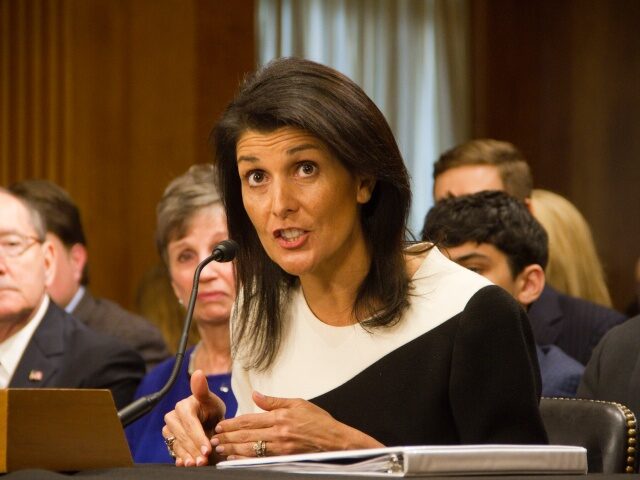Republican presidential primary candidate Nikki Haley once seemingly parroted a talking point used by Democrats that suggests climate change is partially to blame for mass immigration to the United States and other countries.
In January 2017, Haley went before the Senate Foreign Relations Committee to be confirmed as ambassador to the United Nations (UN) in then-President Donald Trump’s administration.
Sen. Jeff Merkley (D-OR), in a written question, asked Haley about so-called “climate refugees,” as Democrats claim that mass immigration to the U.S. and other countries is partially due to global warming’s destroying crops, conditions, and communities in certain regions of the world.
Merkley wrote:
We are already seeing the impacts of climate change on the ground around the world — 2016 was the hottest year on record (and 15 of the 16 warmest years have been since 2000). Some countries have already relocated citizens due to climate change, creating the world’s first climate refugees. Extreme drought in the Middle East and even small amounts of sea level rise in parts of Asia are likely to displace tens of millions of people, and Western nations have been asked to accept some of the displaced people. [Emphasis added]
“Do you agree that the rise in refugees presents a unique national security threat that requires international solutions? What do you view as the role of the U.N. and the United States in aiding with climate refugees around the world?” Merkley asked.
Haley responded:
If confirmed I commit to engaging experts at the State Department and the U.N. on the issues of climate change and refugee resettlement. The U.N. plays a significant role in the management of refugees on a global basis. If confirmed, the role that climate change plays in refugee flows is an issue I look forward to assessing, and assisting refugees is a U.S. policy in which I look forward to engaging. [Emphasis added]
In 2019, as Democrats used the “climate refugees” talking point to lobby for lax enforcement of federal immigration law, researchers at the Center for Immigration Studies (CIS) reviewed crop production in El Salvador, Honduras, and Guatemala.
Ultimately, CIS researchers found scarce evidence suggesting climate change is responsible for mass immigration to the U.S.
“In all three Northern Triangle countries, the majority of the top agricultural products have seen production growth in recent years — in some cases tripling or quadrupling in size,” CIS researchers wrote. “Given the successful crop yields in Latin America, it is hard to imagine that climate change is a major factor driving migration flows. Even with regard to areas with declining production, such as coconuts in Honduras or Coffee in El Salvador, the primary explanatory factors appear to have little to do with climate change.”
Also in Haley’s UN confirmation questions and answers, Sen. Ben Cardin (D-MD) asked “Do you believe that climate change is merely a “concept” and a “hoax” created by the Chinese or someone else?”
Haley responded:
No, I do not believe climate change is a hoax. If confirmed I commit to working with experts at the State Department and elsewhere in the government on the issue and helping to determine what role the U.S. Mission to the United Nations should play. [Emphasis added]
In her answers to Senators, Haley similarly called climate change “real” and “one of the threats” to American national security. These 2017 remarks are in line with Haley’s latest comments, wherein she told GOP primary voters last year that she believes in climate change.
“Is climate change real? Yes, it is,” Haley said at the first GOP presidential primary debate held in August 2023.
John Binder is a reporter for Breitbart News. Email him at jbinder@breitbart.com. Follow him on Twitter here.

COMMENTS
Please let us know if you're having issues with commenting.